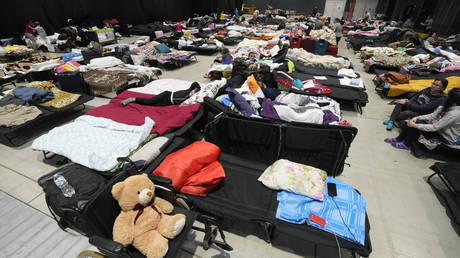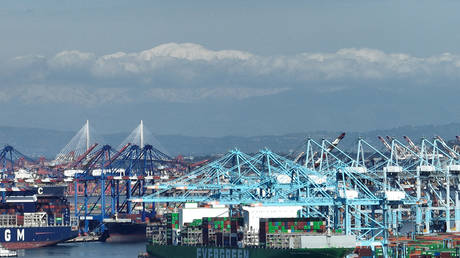
Despite bold political pledges to take in Ukrainian refugees, the West may be unable to deliver, experts warn
Multiple Western nations have pledged to take in Ukrainian asylum seekers fleeing the ongoing Russian offensive in the country. Their ability to actually do so, however, has been already questioned by multiple human rights groups and experts, who point to the fate of now-forgotten Afghan refugees.
Late in March, US President Joe Biden pledged to take in 100,000 Ukrainian refugees. No legal criteria to establish who’s exactly eligible for getting onto the American soil, however, has materialized yet.
The current pledges to Ukrainians have invoked comparisons with the Afghanistan situation, when those who worked for the Western occupation were fleeing the Taliban amid the withdrawal of the US and its allies from the country last August. Back then, Washington announced a priority program for Afghans, while those that managed to flee the country with US military flights, amid the chaotic Kabul evacuation, have been admitted to the US with a temporary status called Humanitarian Parole.
“When it comes to Ukraine, we can only pray the Biden administration takes a different path than it took with the Afghans,” Mark Hetfield, president of HIAS, a Jewish resettlement organization in the US, told the Wall Street Journal.
While some 16,000 Afghans have applied to the priority program, none of them has managed to get into the US so far. The asylum-seeker admission process is an extremely long and complex one, as processing a would-be refugee takes between 12 to 18 months on average, according to the US State Department’s own admission.
“On paper, there is a program, there is some sort of nominal process,” Sunil Varghese, policy director of the International Refugee Assistance Project, told the newspaper. “But it doesn’t seem like there’s the political will to make this a big, robust thing.”
Now, many Afghan asylum seekers who sought to obtain refugee status in the US are seeking to settle elsewhere instead of staying trapped in a bureaucratic limbo while living in temporary shelters. The uncertain future is taking a heavy toll on these displaced persons, Jumana Abo Oxa, a mental-health care manager with Elpida Home, a Greece-based NGO helping refugees, told the newspaper.
“People thought they’d move on in two or three weeks. People are going through emotional hurricanes. They’ve lost everything. They have families stuck in Afghanistan that can’t leave,” she said.
Afghans who escaped the Taliban have faced a similar fate in the UK, another country that made bold pledges to help them – as well as to Ukrainians amid the new crisis. Unlike the US, London has admitted Afghan refugees into the country, but largely failed to provide them with permanent places to live. Some eight months after the fall of the Western-backed Afghan government, London had managed to provide only 4,000 with places to live, while a further 12,000 remain temporarily housed in hotels.
Helping asylum seekers in the UK has proved a painstaking process, riddled with inept government planning, lack of political attitude and overall hostility towards Afghan people, Steve Valdez-Symonds, refugee and migrant rights program director for Amnesty International UK, told the New York Times.
“There is a xenophobic attitude underpinning immigration and asylum policy in the UK,” he said.




